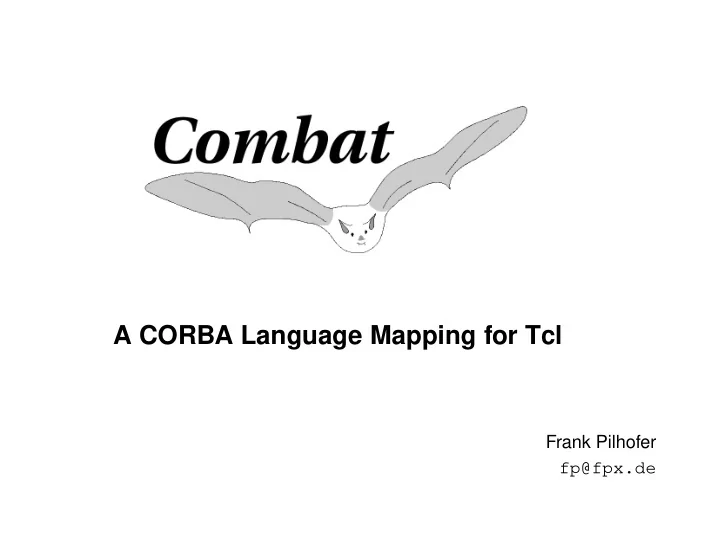

A CORBA Language Mapping for Tcl Frank Pilhofer fp@fpx.de
� � � � � CORBA De-facto standard for distributed systems Ideal for heterogeneous systems, independent of Hardware, Operating System, Programming Language and Vendor Open standard, documents freely available Based on Client/Server model Object-oriented 1
Processing a CORBA Request Interface Description Language interface Calculator { double calculate (in string expr); }; Client code Server code class Calculator { IDL Compiler set calc "IOR:......" public method calculate {expr} { return [expr $expr] puts "[$calc calculate 1+1]" } } Type Info Type Info Interface Dynamic Stub Dynamic Skeleton Repository GIOP Client-Side ORB Server-Side ORB 2
� � � � CORBA Language Mapping Maps IDL data types to target language types – Simple data types ( boolean , short , long , double , string , . . . ) – Complex data types ( struct , sequence , any , . . . ) Defines representation of client-side stubs Representation of server-side skeletons Official language mappings exist for C, C++, Java, Smalltalk, Ada, COBOL, Python and IDLscript 3
� � � � ✁ � Tcl Language Mapping - IDL Types Most simple IDL types can be represented with native Tcl types Other types ( unsigned long (32 bit), long long (64 bit), fixed (fixed-point decimal)) are mapped to Tcl strings Complex types are mapped to Tcl lists, e.g. matches foo bar sequence<string> Thanks to Tcl’s lax type system, IDL data types blend in naturally and intuitively 4
� � � � � Tcl Language Mapping - Client-Side Stubs User Code Stubs are mapped to Tcl procedures, Generic Stub “handles”, that encapsulate object address First argument is interpreted as operation Interface Repository To Server Client-Side ORB name, remaining aguments as parameters Client Type information is retrieved from the Interface Repository at runtime client side is fully dynamic Open question: garbage collection of handles? (Core patch!) 5
� � � � � � � Tcl Language Mapping - Server-Side Skeletons Servants (instances of a Skeleton) have state, code and identity servants are objects! Consequently, skeletons are mapped to [ INCR T CL ] classes The user extends the generic skeleton base class and implements an interface’s methods Type information is retrieved from the Interface Repository at runtime server side is fully dynamic Open questions: multiple inheritance, garbage collection? 6
� � � � Language Mapping Summary IDL types must be mapped to native Tcl types and have an intuitive string representation Stubs and skeletons should be fully dynamic, without requiring compile-time information Client side needs asynchrony features to keep the event loop running (especially for seamless Tk integration) Is garbage collection of handles/objects compulsory, or should the mapping only rely on current Tcl/[incr Tcl] features? 7
� � Current State Combat/C++ – Tcl extension that hooks up to any CORBA 2.3 ORB – Full Client- and Server-side solution Combat/Tcl – Proof-of-concept version in pure Tcl – Full Client-side implementation – Ideal for heterogeneous environments, embedded devices or sandboxes 8
Recommend
More recommend